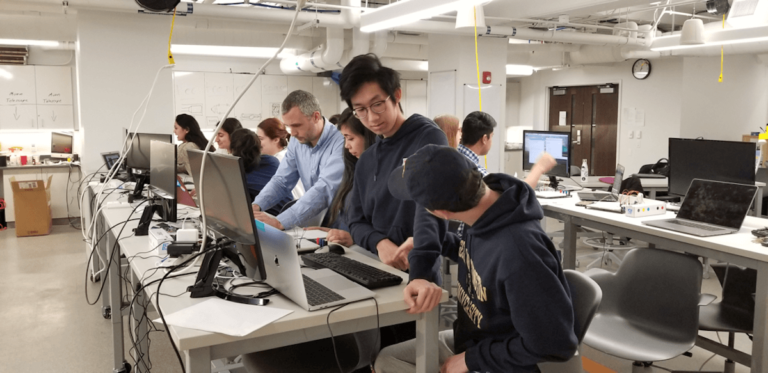
The mysteries of the universe are always unravelling, yet there’s much more to be solved.
With the development of new technologies like Artificial Intelligence, and cutting-edge research conducted in universities worldwide, scientists are making new exciting discoveries every day.
In physics, the demand for professionals is expected to grow in the future to keep up with scientific research and exploration.
According to the US Bureau of Labor Statistics, “Overall employment of physicists and astronomers is projected to grow 9 percent from 2018 to 2028, faster than the average for all occupations.”
By offering physics studies that push the boundaries of science and educate students on how to think innovatively, universities are preparing students to become impactful physicists who can find solutions to complex global challenges.
One such university is the highly-ranked George Washington University in Washington DC, where the Department of Physics engages in collaborative research with some of the area’s world-renowned centers, such as the US Naval Research Laboratory (NRL), NASA Goddard Space Flight Center (GSFC), and Jefferson Lab in Newport News, Virginia (JLAB).
Here, faculty and students are at the frontlines of transformative physics studies where they are constantly seeking answers to fundamental physics questions.
The Department of Physics includes Astrophysics, where undergraduates can either major or minor in the field.
Graduate students in the Master of Science in Physics or PhD programme can join the GW Astrophysics group which collaborates with NASA, the Naval Research Laboratory, and other universities.
Students can also minor or major in Biophysics where there are also research opportunities for graduate students in our new Science and Engineering Hall (SEH) and at the National Institute of Health (NIH).
For Nuclear Physics, both undergraduate and graduate students can choose between Experimental, Theoretical and Nuclear Phenomenology research groups. These group work in collaboration with colleagues at Jefferson Lab in Newport News, Virginia, Johannes Gutenberg University in Mainz, Germany and the Paul Scherrer Institute in Villigen, Switzerland.
State-of-the-art facilities for exciting physics studies
The proximity to federal and national laboratories such as Jefferson Lab, the Naval Research Laboratories, National Institute of Standards and Technology and National Aeronautics and Space Administration provides unparalleled research and employment opportunities for students.
Plus, students are given plenty of tools and workspaces, such as our new Innovation Lab, to conduct cutting-edge research and work on projects during their physics studies.
For example, the new Science and Engineering Hall and the recently renovated Corcoran Hall have been outfitted with new facilities where faculty and students can work together and collaborate with other departments on exciting scientific breakthroughs.
The George Washington Institute for Nuclear Studies (GWINS) provides an organizational center for many of the research and education efforts at GW in nuclear science and technology. GWINS houses the Data Analysis Center, home of the SAID Partial-Wave Analysis facility and nuclear data base.

GW Department of Physics
The GW Astronomy, Physics and Statistics Institute of Sciences (APSIS), is a multidisciplinary center that focuses on research in multi-wavelength observations, statistical inference, modeling and simulations of high-energy phenomena in the universe.
Promoting a collaborative environment, those from different departments come together to conduct data-intensive research.
Those from the Physics Department conduct research in areas such as traditional multi-wavelength astronomy and emerging subfields in astrophysics with particle physics.
Physics studies at this university are known to be taught by excellent and experienced faculty who not only support students, but strive to engage and challenge them so they can develop to their full potential.
Brendan O’ Conner, a graduate student, said, “I chose GWU because of the proximity to NASA Goddard Space Flight Center where I now am funded to work for my research/thesis project.
“I was interested in High Energy Astrophysics and this department is focused on the topics I was looking to engage in more so than other astronomy programmes that I was accepted into.
“I was also looking for a small department because I went to a liberal arts school of 2,000 students and that was something I required. I enjoy smaller class sizes where you know the professor well and the professor is always available, which I found here.”
Pathways to employment
Both undergraduate and graduate students at GW Department of Physics have an edge when it comes to securing employment thanks to multiple opportunities to gain work experience.
They can also build their professional network via the GW International Research Experience for Students programme.

GW Department of Physics
Graduate student, John Grant Mitchell, said, “One of the best experiences I have had at GWU has been working as a teaching assistant. When I started my graduate career, I was certain that I wanted to work at a national laboratory or as a research professor upon finishing my degree.
“However, after working as a teaching assistant for two years, I am very excited about the prospect of becoming a professor and having the opportunity to teach.
“I hope to have a faculty position (or post-doc) at a university that will allow me to teach as well. My experience as a teaching assistant has prepared me for a career teaching physics, and the support of GWU in me doing my research at NASA Goddard Space Flight Center has prepared me for a career in astrophysics research.”
Through a supportive and research-intensive environment, physics students at George Washington University graduate as analytical physicists with the ability to think critically and innovatively.
Follow GWU on Facebook, Twitter, YouTube and Instagram
Liked this? Then you’ll love…
Become the physicists the world needs with the help of a physics degree
Duke University: Forward-looking master’s programs for engineering leaders







